Egyptians' confidence in their political system surged after the revolution, as did their enthusiasm for participating in it, though many express concern about a lack of jobs and an increase in crime.
The world seemed spellbound for 18 intense days in early 2011, as millions watched Egyptian protesters, undeterred by tanks and tear gas, stand firm for their dignity and a better future. Yet the central story began long after the television cameras left Tahrir Square - the historic epic of building a democratic nation atop the ruins of a despotic regime.
This report chronicles the beginning of Egypt's journey toward democracy. The analysis is based primarily on a nationally representative, face-to-face survey of approximately 1,000 respondents in Egypt aged 15 years and older between late March and early April 2011.[1] Gallup plans to continue tracking the nation's pivotal transition on a monthly basis.
In the wake of the revolution that drove President Hosni Mubarak from office, Egyptians expect a bright political and economic future for their country and appear committed to working for it. They envision a representative government where religious principles guide the democratic process, but with clerics limited to an advisory role. No other population Gallup surveys rejects attacks on civilians more than Egyptians, whose faith in peaceful means of change has only increased since unarmed protesters brought down the country's ruler of more than 30 years. This triumph earned Egyptians the admiration of many, including the majority of the American people.
At the same time, Egyptians are less satisfied with their standard of living and the availability of necessities like quality healthcare, good affordable housing, and jobs. They feel their communities have become less safe and less tolerant, and many no longer trust the police. While the country undoubtedly requires strong leadership to forge the path over these hurdles, no political party has the support of more than 15% of the public. Many Egyptians also have little faith in the leadership or intentions of the United States, requiring the superpower to tread carefully when attempting to support Egypt's democratic transition.
Egyptian leaders must deliver on their people's expectations for free and honest elections, building on the success of the constitutional referendum. Economic growth must go hand in hand with political reform to sustain a healthy transition to democracy. To enable this, leaders should consider streamlining and simplifying the process for new business development to create more jobs. Civil society activists and policymakers alike would do well to approach security and community cohesion as a local issue requiring reform of local institutions. Moving from the city to the region, no international issue is more urgent for Egypt than resolving the Palestinian-Israeli conflict.
The most important thing the U.S. can do to support Egypt in its transition to democracy is to protect its ally's political independence by standing for principles, not political parties or people. Moreover, Egyptians are looking to their allies to support concrete projects that address urgent economic needs like healthcare and housing, more than they are seeking "democracy promotion." Egypt, with its size, regional influence, and geographic location, remains a critical ally for the U.S. While a relationship with a democratic Egypt, built on shared values and interests, has the potential to be stronger than ever before, it also requires greater alignment between the views of the U.S. government and the Egyptian people. For this reason, the U.S. must be a partner in ending the decades-long Palestinian-Israeli conflict if it is to secure a sustainable relationship with the new Egypt.
Assets on Which to Build a New Egypt
In the wake of Mubarak's resignation, Egyptians are more positive about their future and their country's political and economic prospects. These positive feelings about the years to come are reflected in how Egyptians rate their lives on the Cantril Self-Anchoring Striving Scale of 0 to 10, where 10 means the best life possible and 0 means the worst life possible today and into the future. Egyptians forecast that, five years from now, their lives will be an average of 5.7 on the life evaluation scale, up from their 4.9 rating in the fall of 2010. Currently, though, Egyptians rate their lives today at a 3.9, down from 4.4 in the fall. This wider gap between their assessments of today and their hopes for tomorrow reflect an optimism Egyptians have lacked for several years.
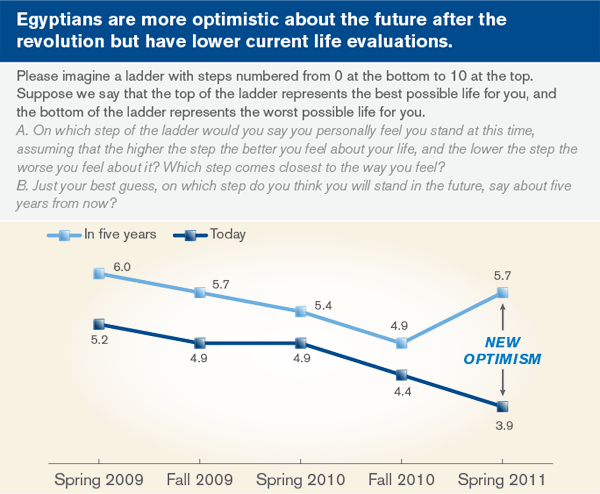
This may be because most Egyptians now believe their society will become fairer and freer as a result of the revolution, which 83% of the population say they supported. The citizens of the region's largest nation expect evenhandedness at the polls, with 9 in 10 saying they believe the upcoming presidential elections will be fair and honest, and the same proportion of eligible voters saying they will vote. This compares with less than 30% who said they had confidence in elections in 2010.[2] Moreover, 79% of Egyptians now say they think the media will be able to report the news freely, versus 62% who said that before the revolution. Some of that confidence was already evident in the March 19 constitutional referendum, in which 41% of eligible voters participated. That was a big jump from the latter years of Mubarak's rule, when less than one-quarter of eligible voters routinely participated.
Though protesters were more likely to be young, educated, and male, they spanned the demographic spectrum. Their average household income reflected the public at large.
These results are not surprising considering that many Egyptians will expect more freedom after a popular revolution. Perhaps unexpected, though, is the rate at which they are more positive about the economy. Egyptians are three times as likely a month and a half after Mubarak's resignation to say they believe the country's economy is getting better (46%) than they were in the fall of 2010 (15%), despite the economic uncertainty created by political upheaval. Egyptians are also more likely now than in late 2010 to say they think they can get ahead by working hard (93% versus 81%). And Egyptians are half as likely now (11%) as before the revolution (23%) to say they would move permanently to another country if given the opportunity - by far the lowest percentage among Egypt's regional economic peers.[3]
Fewer Egyptians want to migrate
Egyptians are more likely now than in the fall of 2010 to say they would like to continue living in their country, despite a decline in their perceived standard of living. This is a departure from a trend seen from 2008 through 2010, when Egyptians' desire to stay permanently in their home country moved in lockstep with how satisfied they were with their standard of living. The change from fall 2010 to spring 2011 in desire to stay in Egypt reveals a level of commitment to the country that hasn't been evident in the recent past.
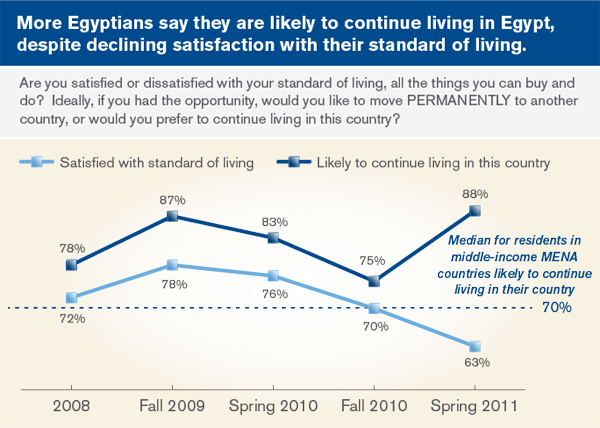
The willingness of Egyptians to take a longer view could benefit the national economy, driving consumer confidence upward and making citizens more apt to invest in Egyptian stocks and deposit their money with Egyptian banks. Moreover, 69% of Egyptians now say they have confidence in the country's financial institutions, compared with 43% before the revolution. However, the high expectations for economic improvement leave the country's new leaders with little margin for error. Eighty-two percent of Egyptians say it is very important that economic conditions improve, according to the Pew Research Center. If the hoped-for economic improvements do not materialize, it could create a great deal of discontent among the population.
A place for religion in the new democracy
Egyptians are clearly eager to take on the challenges and burdens of democracy. Freedom of speech has been a top political aspiration of Egyptians for years, and it remains so in the wake of the revolution. Ninety-two percent of Egyptians say they would include freedom of speech as a provision if they were drafting a new constitution for a new country. Sixty-seven percent of Egyptians say the same about freedom of religion, and 55% say it about freedom of assembly. In a Pew Research Center survey conducted after Mubarak's resignation, 64% of Egyptians said the country should use some form of democratic government to solve its problems, versus the 34% who said the country would be better off relying on a strong leader.[4]
At the same time, religion remains important to most Egyptians (96%), and 92% say they have confidence in religious institutions. It is not surprising, then, that many Egyptians reject the idea that government should carry on its business without considering religious doctrine. Shortly before the revolution, most people in the country believed that Islamic religious principles, in the form of sharia, should factor into the country's legislation.
Egyptians, however, express little interest in recreating their country in the image of Iran, as has been the fear among some Western commentators. Less than 1% say the Islamic Republic should be Egypt's political model, and most Egyptians think religious leaders should provide advice to government authorities, as opposed to having full authority for determining the nation's laws. The majority of residents in the Arab world's most populous nation desire a democracy informed by religious values, not a theocracy.
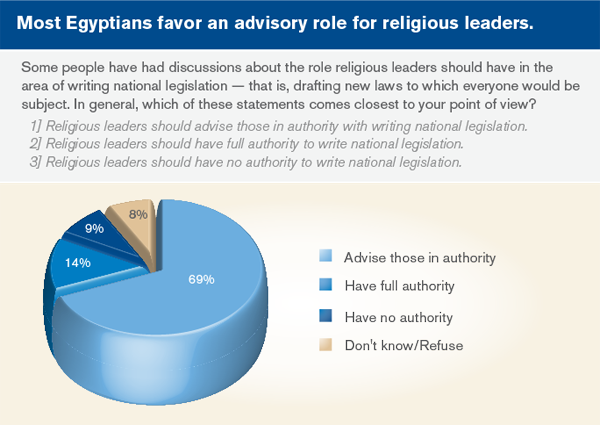
Rejecting violence, including among faiths
Egyptians are the most likely people of any country in the world to say the targeting and killing of civilians is never justified (97%). Not only do Egyptians reject civilian attacks on moral grounds, but most also believe peaceful means are effective for correcting injustice. During the five years that Gallup has been conducting surveys in the country, the majority of Egyptians have said they believe that peaceful means alone are sufficient to improve the circumstances of oppressed groups. With the success this year of the Egyptian revolution, Egyptians' confidence in non-violent means of change has surged.
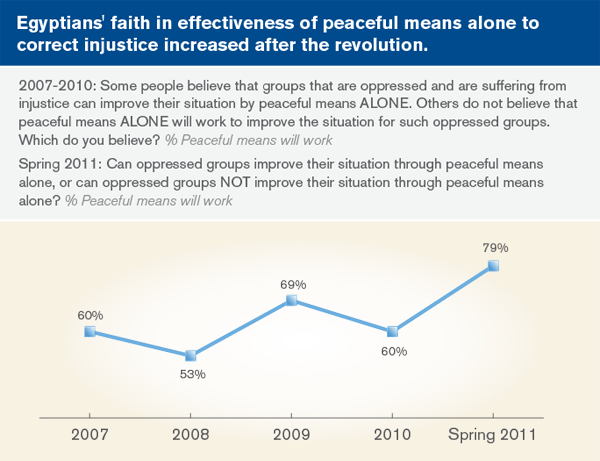
With the disappearance of the Mubarak police state, there has been a perceived rise in violent crime in Egypt. However, the violence, including a sectarian street fight in May 2011 that left six Muslims and six Christians dead near the Church of St. Mina in Cairo, may reflect the criminal actions of a few as opposed to evidence of a generally intolerant society.
Egyptians rank near the top of all populations in the Middle East and North Africa (MENA) when it comes to welcoming religious diversity. Two-thirds of Egyptians say they would have no objections if someone of another faith moved in next door to them, second only to Lebanon in the region. Additionally, 78% of Egyptians are at least tolerant of (if not integrated with) other religious faiths.[5] Among other MENA countries, only Lebanon is less isolated along religious lines.
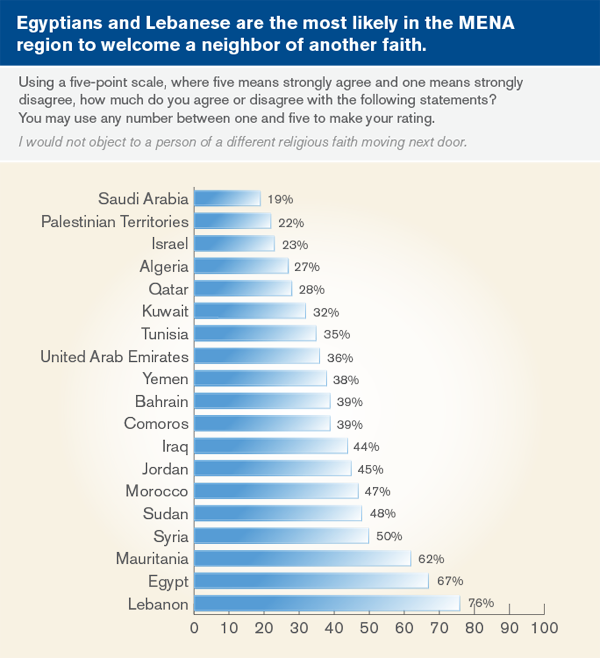
American support for the revolution
Media coverage of the Egyptian uprising, with millions of people peacefully demonstrating in Tahrir Square despite the presence of tanks, won the respect and admiration of the U.S. public. Surveying conducted during the second week of the conflict, found that 82% of Americans were sympathetic to the protesters - including 87% of those following the situation in Egypt closely.[6] In fact, roughly the same portions of the American and Egyptian public had this view. The percentage of Americans who said they had a favorable opinion of Egypt declined toward the end of the protests, as Americans saw the regime use force against peaceful protesters - it fell to 40% shortly before Mubarak officially resigned from his post as Egypt's president.[7] According to an April 2011 survey conducted by the Program on International Policy Attitudes (PIPA), however, Americans' overall favorable opinion of Egypt bounced back, with 60% of the U.S. public saying it had a favorable opinion of Egypt, and 70% saying the same about the country's people. This is comparable to the percentage of Americans who said they had a favorable opinion of Israel (69%), and much higher than those who said the same about Syria (32%).[8]
Clearly, the door is open to greater cooperation between Egypt and the U.S., something that is important to both nations and could certainly be valuable to Egypt's new leadership, once in place. That said, Egypt-U.S. cooperation also faces some significant challenges.
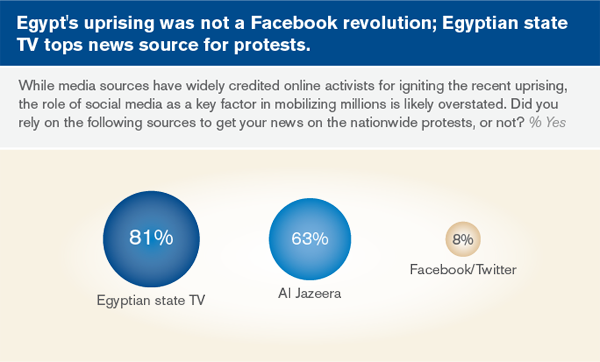
Challenges to Positive Change
A leadership void throughout the country
In the weeks after Mubarak's resignation, the euphoria about being free of an increasingly corrupt and repressive government gave way to concerns about the sudden void in political leadership. The void is evident in the fact that currently no group in Egypt has emerged as a viable political party. Specifically, Egyptians are most likely to voice support for the Muslim Brotherhood, but not at a level much higher than that for Mubarak's deposed National Democratic Party. This makes it likely that Egypt's next parliament will need to create a coalition unity government, which could lead to deadlocks and may end up slowing the legislative process. However, a patchwork parliament would also require all parties to make compromises, lowering the risk of any one group imposing its views without challenge, as was the case with the former ruling party.
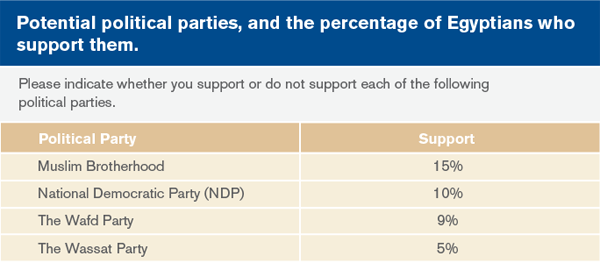
Post-Mubarak Egypt is also concerned with its economy. At the city or local community level, where people live and work, Egyptians are twice as likely to say the economy is getting worse now than they were one year ago. Meanwhile, a large majority of Egyptians (81%) continue to say now is a bad time to find a job.
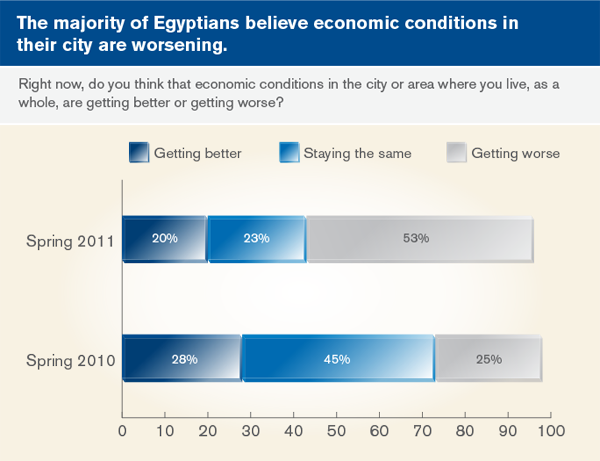
Economic woes, perceived surge in crime plague neighborhoods
Two issues contributing to Egyptians' concerns about their local economy are their perceptions about the availability of good affordable housing and quality healthcare. Gallup research finds Egyptians rate the availability of both worse now than before the revolution.
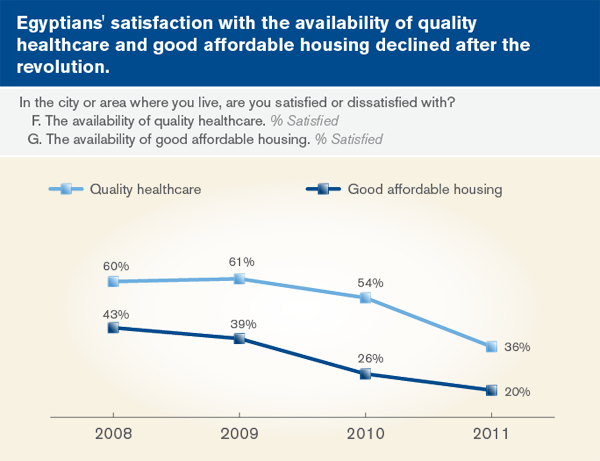
The lack of good affordable housing and quality healthcare, in addition to the difficulty finding jobs, aren't the only problems plaguing Egypt's cities and towns. Satisfaction with local leadership at the community level is also lacking. The percentage of Egyptians who say they approve of the leadership in their city or area has fallen to 28% from 47% two years earlier. This finding is perhaps not a surprise, as most local governments were appointed by a now-discredited regime.
The biggest institutional void, or at least the one producing the most consequences at the moment, is in the area of law enforcement.
During the uprising in early 2011, protesters destroyed many police stations, lashing out at a hated symbol of Mubarak's rule. However, with the police force humbled and diminished in number, Egyptians see their streets as less secure. Almost two in five people now say they don't feel safe walking alone at night in the city or area where they live. The percentage is twice as large as it was last year.
It is worth noting, however, that according to Gallup's spring 2011 survey, there was a slight decline in the percentage of Egyptians reporting incidences of theft and assault. This could be the result of greater civic engagement, which studies suggest is associated with lower crime rates.[9] If this is indeed the case, increased fear may be due to a greater media focus on crime and violence.
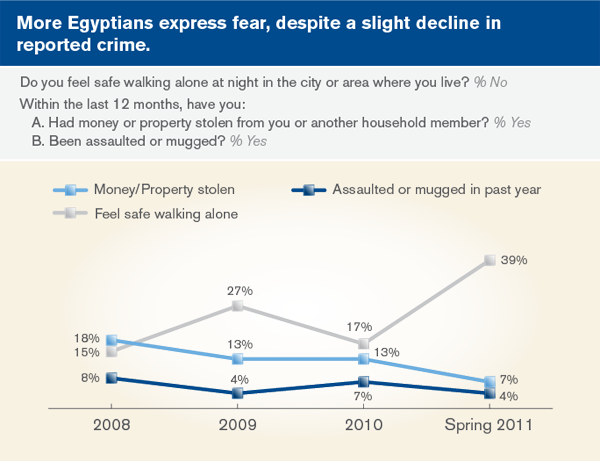
Distrust of U.S. leadership and motivations
With the exception of a few months before and after U.S. President Barack Obama spoke at Cairo University in June 2009, Gallup surveys find Egyptians' approval of American leadership at or below 20%.[10]
At this critical juncture in their history, Egyptians are apprehensive about possible U.S. interference in their political affairs. About two-thirds of Egyptians disagree that the U.S. is serious about encouraging democratic systems of government in MENA. While that percentage is lower now than in 2009, when three-quarters of Egyptians expressed such skepticism, it still implies that a majority of Egyptians distrust American motives. Additionally, 68% of Egyptians think the U.S. will try to exert direct influence over Egypt's political future as opposed to letting the people of the country forge that future for themselves.
Egyptians overwhelmingly oppose the U.S. sending aid to political groups in their country. Surprisingly, this is especially the case among those who look to America as a political example. While 75% of the general public opposes U.S. aid to political groups, 88% of Egyptians who favor a U.S. model for their country say the same. This suggests that a refusal of financial assistance to political groups points not to a rejection of American political principles, but rather to a hunger for self-determination - unsurprisingly more strongly voiced by those wishing to emulate America.
This desire for political independence may explain Egyptians' discomfort with accepting U.S. financial aid. Even among Egyptians who think their country should look to the U.S. system of democracy as a model, 43% oppose the idea of accepting economic aid from the U.S. The level of opposition is higher among Egyptians as a whole (52%). This is especially noteworthy considering Egyptians' immediate economic challenges, suggesting that they are rejecting aid out of suspicion rather than lack of need.
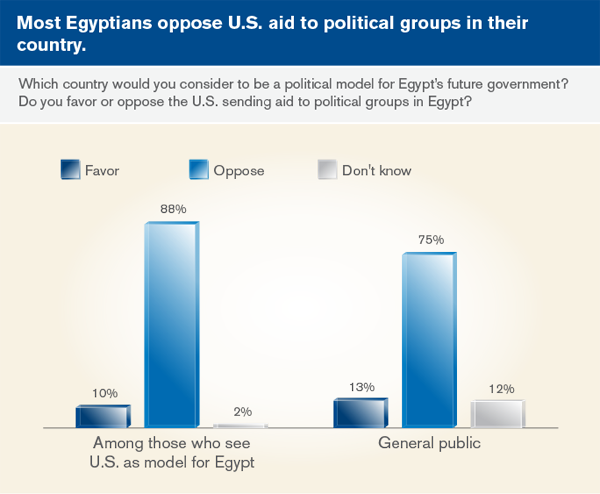
Differences on foreign policy with respect to Israel, Iraq, and Afghanistan also loom as major stumbling blocks in Egypt-U.S. relations. Three months after the revolution, Egypt stepped in and played a key role in brokering reconciliation between Hamas and Fatah, the two Palestinian factions. It was a foreign policy initiative that alarmed U.S. officials, but one that is likely popular among Egyptians, 54% of whom would like to see their country annul the peace treaty it entered into with Israel more than 30 years ago.[11]
America's application of pressure on Israel with respect to settlements in the West Bank and its withdrawal from Iraq and Afghanistan are potential policy moves that would significantly improve Egyptians' opinion of the U.S.
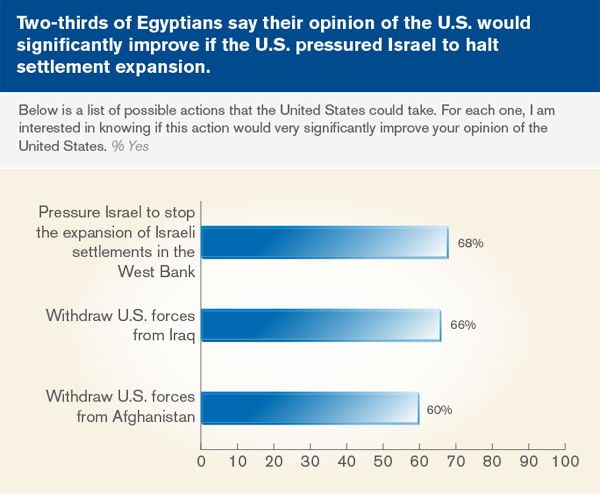
Recommendations for Egypt
Egyptian leaders - whether in government, civil society, or the private sector - should move quickly to lay the foundation for an improved economic and political future. Here are some things they can do.
Build on the success of the referendum vote to carry out and build public trust for transparent and fair elections. The elevated level of civic participation - 9 in 10 Egyptians say they expect the next elections to be honest and fair, and that they will vote in them - bodes well for the fledgling democracy. It also means that leaders can expect a significant public backlash if voters don't get the type of elections they expect.
Judiciary monitoring was used in the March referendum, and with 80% of Egyptians saying they have confidence in the judicial system, leaders should take advantage of this monitoring again in the upcoming elections. Other ways that leaders can make the upcoming elections successful are by having the military (which has the confidence of 94% of Egyptians) provide security, and by using television to educate citizens and encourage them to vote.
Create jobs and encourage new business development so that more can share in the country's macroeconomic success. One of the major problems with Egypt's economy is that its growth tends to not benefit the majority. This was evident before the revolution, when Egypt's per capital gross domestic product grew by 5% in 2010, but just one-fifth of Egyptians said they believed economic conditions were getting better.[12] To address this problem, Egypt should take steps to facilitate entrepreneurship.
-
Shortening, streamlining, and simplifying the process of starting a business
-
Launching a national campaign to generate new ideas for a business
-
Pairing the top submissions with business leaders as mentors
-
Leveraging international matching investments to provide seed capital for a select number of ideas
-
Increasing security so that the tourism industry - crucial to Egypt's economy - rebounds
Improve inter-religious cohesion by focusing on national unity and citizenship equality, rather than pushing for a "secular state." Leaders must address the highly publicized recent clashes between Muslims and Christians, but it is important to do so in the right way. For instance, a rebuilt (and more trusted) local police force will improve overall security. Civil society for its part should provide opportunities for greater citizen cooperation at the neighborhood level, building trust and lowering the perception of security issues.
It bears repeating, the majority of Egyptians support freedom of worship, understand the need to coexist with those of other faiths, and oppose terrorist violence. These societal assets are already in place. Leaders, including civil society activists, should call on those values to emphasize the principles of citizen equality and national unity. An attempt to marginalize religion, or to push for a secular state through constitutional reform, as a means to decrease sectarian tensions will likely encounter stiff opposition and create greater division. Moreover, demonizing Islamist groups is likely to further strain interfaith relations. For example, Egyptians may not think the Muslim Brotherhood should run the country, according to Gallup research, but 75% of Egyptians have a "somewhat favorable" or "favorable" opinion of the organization, according to the Pew Research Center.[13]
Reform local governments and institutions. While Egyptians are optimistic about the national economy and political system, current views of their local communities are much more negative. Egyptians believe that economic conditions in those communities are worsening, and they see their immediate cities and towns as intolerant and increasingly less secure.
To address these local shortcomings, leaders should do three things:
-
Transition from government appointments to direct elections. Elections for local governors and mayors can take place quickly following national elections.
-
Study the feasibility of creating local police forces to replace national police and rebuild trust. As part of this, it may make sense to allow towns to elect their own police chiefs.
-
Build on the success of recent community policing, in which citizen groups in many Egyptian neighborhoods took to the streets to provide protection against gangs. Community leaders should create new opportunities for local cooperation, such as regular neighborhood volunteer projects, to increase community cohesion. Studies suggest that greater civic participation and personal connections between neighbors can significantly reduce crime rates.[14]
Work tirelessly to end the Palestinian-Israeli conflict. The status quo of Palestinians not having a homeland, living in poverty, and struggling for dignity is not acceptable to Egyptians, as is evident in the desire many Egyptians have to see the Camp David peace accords with Israel annulled. Egyptian leaders will almost certainly find themselves under more pressure on matters relating to the Palestinians. While maintaining its international obligations, the Egyptian government must build on its successful mediation of Palestinian unity and continue to take constructive steps toward resolving the conflict.
Harness Egypt's positive image with the American public to forge a new relationship with the U.S., built on mutual respect and mutual interest. This will position Egypt to play an important peacemaking role in the region. It is also the best way to forge important trade and investment relationships and refuel Egypt's economy.
Recommendations for the U.S.
America's stated goal is to help Egypt transition to a strong and stable democracy, and offer a positive example to the region. American leaders can increase the likelihood of achieving this goal if they implement the following strategies.
Protect the independence of Egypt's political system by supporting democratic principles, not political parties or individuals. Given the impression most Egyptians have, that America tries to shape Middle Eastern politics to its own ends, the United States must tread carefully. In the last two years, the percentage of Egyptians who believe that the U.S. is serious about supporting democracy in MENA has risen somewhat, but two-thirds still disagree. For this minority view to have a chance of becoming more common, U.S. leaders must remain neutral in, and distant from, Egypt's political process. To this end, the U.S. should consider the following:
-
Reconsider its proposed plan to directly choose and fund Egyptian civil society groups. The vast majority of Egyptians oppose the proposition of U.S. aid to Egyptian political groups. While civil society groups and political groups are not identical, their areas of overlap may be too great at this delicate stage to make a distinction.
-
Take pains to avoid rhetoric that might be interpreted as anti-religion, such as encouraging Egyptians to form a secular state.
-
Call for democratic principles in general, and say they should benefit all people. Singling out minority groups for extra protection may backfire.
Invest in favorable trade agreements and concrete, visible projects that directly address a societal need, rather than "democracy promotion." Partly as a result of the March referendum, Egyptians are confident in their ability to hold free and fair elections and aren't looking for the U.S. to provide financial or logistical support for upcoming votes. American dollars are better invested in projects that meet an immediate community need, such as better local housing and healthcare.
U.S. leaders should explore the possibility of a free trade agreement with Egypt, and could work with the Egyptian government to provide greater transparency into how American aid is being allocated. This would go a long way toward addressing Egyptian ambivalence about U.S. assistance.
The recent announcement from White House officials of debt forgiveness for Egypt was a bold step in the right direction.
Work tirelessly to end the Palestinian-Israeli conflict. The Palestinian-Israeli conflict remains a major point of difference between Americans and Egyptians. Almost 70% of Egyptians say their opinion of the U.S. would significantly improve if it pressured Israel to halt settlement expansion, something many Egyptians believe President Obama committed to in his 2009 address in Cairo. One of the hallmarks of a democracy is that leaders cannot disregard what citizens want. In Egypt's case, this includes an end to the Palestinian-Israeli conflict. The U.S. must be a partner in ending this decades-long stalemate if it is to secure a close and mutually beneficial relationship with Egypt.
Survey Methods
Gallup is entirely responsible for the management, design, and control of this study. For the past 70 years, Gallup has been committed to the principle that accurately collecting and disseminating the opinions and aspirations of people around the globe are vital to understanding our world. Gallup's mission is to provide information in an objective, reliable, and scientifically grounded manner. Gallup is not associated with any political orientation, party, or advocacy group and does not accept partisan entities as clients.
Results are based on face-to-face interviews in Egypt with approximately 1,000 adults in each survey administration, aged 15 and older, from 2007 to 2011. Surveys took place in July 2007; in 2008, they were conducted April 23-May 18; in 2009, surveys took place March 7-22 and Aug. 11-19; in 2010, they were conducted March 13-23 and Sept. 25-Oct. 26; and in 2011 surveys were conducted March 25-April 2. For results based on the total sample of national adults, one can say with 95% confidence that the maximum margin of sampling error ranges from ±3.1 to ±3.5 percentage points. The questionnaire was translated into Arabic. The translation process starts with an English version. A translator who is proficient in the English and Arabic languages translates the survey into the target language. A second translator reviews the language version against the original version and recommends refinements.
All other results for countries mentioned in this article are based on face-to-face interviews in 2009 with approximately 1,000 adults, aged 15 and older, in each country. For results based on the total sample of national adults, one can say with 95% confidence that the maximum margin of sampling error ranges from ±3.3 to ±4.2 percentage points. Surveys in Arab Gulf countries were conducted with nationals and Arab expatriates.
Results from the American public are based on telephone interviews conducted Feb. 2-5, 2011, with a random sample of national adults, aged 18 and older, selected using random-digit-dialing sampling. Interviews are conducted with respondents on landline telephones and cellular phones. Each sample includes a minimum quota of 150 cell phone-only respondents and 850 landline respondents. Landline respondents are chosen at random within each household on the basis of which member had the most recent birthday. For results based on the total sample of national adults, one can say with 95% confidence that the maximum margin of sampling error is ±4 percentage points.
The margin of error reflects the influence of data weighting. In addition to sampling error, question wording and practical difficulties in conducting surveys can introduce error or bias into the findings of public opinion polls.
Abu Dhabi Gallup Center
The Abu Dhabi Gallup Center is a Gallup research hub based in the capital of the United Arab Emirates. It is the product of a partnership between Gallup, the world's leading public opinion research firm, and the Crown Prince Court of Abu Dhabi.
Building on Gallup's seminal work in the field of Muslim studies, the Abu Dhabi Gallup Center (ADGC) offers unmatched research on the attitudes and aspirations of Muslims around the world. In addition to its worldwide scope, the ADGC focuses on the specific priorities of its regional base and presents innovative analysis and insights on the most important societal challenges facing the United Arab Emirates and the Gulf Cooperation Council (GCC).
[1] Gallup surveys conducted in the United States were with respondents aged 18 years and older, as were surveys conducted in Egypt by other entities cited in this report.
[2] Egypt: The Arithmetic of Revolution, Abu Dhabi Gallup Center, March 2011
https://www.abudhabigallupcenter.com/146888/brief-egypt-arithmetic-revolution.aspx
[3] Middle-income GDP MENA countries include Egypt, Algeria, Tunisia, Jordan, Syria, Lebanon, Morocco, Libya, and Iraq. Categories based on 2010 estimates of GDP per capita in U.S. dollars provided by the International Monetary Fund.
[4] Egyptians Embrace Revolt Leaders, Religious Parties and Military, As Well, Pew Research Center, April 25, 2011
[5] Gallup categorizes people as either isolated, tolerant, or integrated depending on how they answer five questions, including whether they have learned anything from a person of another faith in the past year and whether they think religions other than their own make a positive contribution to society.
[6] Americans Sympathetic to Egyptian Protesters, Gallup, February 7, 2011
https://www.gallup.com/poll/145979/Americans-Sympathetic-Egyptian-Protesters.aspx
[7] Americans' Views of Egypt Sharply More Negative, Gallup, February 8, 2011
https://www.gallup.com/poll/146003/Americans-Views-Egypt-Sharply-Negative.aspx
[8] The American Public and the Arab Awakening, Program on Internal Policy Attitudes (PIPA) and the Anwar Sadat Chair for Peace and Development at the University of Maryland, April 12, 2011.
[9] Buonanno, P., Montolio, D., and Vanin, P. Does Social Capital Reduce Crime?, 2006.
http://dspace-unibg.cilea.it/bitstream/10446/230/1/WPEco05(2006)Buonanno.pdf
[10] Interestingly, one group of Egyptians more prone to approving of U.S. leaders are those who support the Muslim Brotherhood as a prospective political party. Among Muslim Brotherhood supporters in Egypt, 26% say they approve of U.S. leadership, suggesting the Muslim Brotherhood's reputation for being anti-American doesn't tell the whole story.
[11] Egyptians Embrace Revolt Leaders, Religious Parties and Military, As Well, Pew Research Center, April 25, 2011
[12] Egypt: The Arithmetic of Revolution, Abu Dhabi Gallup Center, March 2011
https://www.abudhabigallupcenter.com/146888/brief-egypt-arithmetic-revolution.aspx
[13] Egyptians Embrace Revolt Leaders, Religious Parties and Military, As Well, Pew Research Center, April 25, 2011
[14] Buonanno, P., Montolio, D., and Vanin, P. Does Social Capital Reduce Crime?, 2006.
http://dspace-unibg.cilea.it/bitstream/10446/230/1/WPEco05(2006)Buonanno.pdf